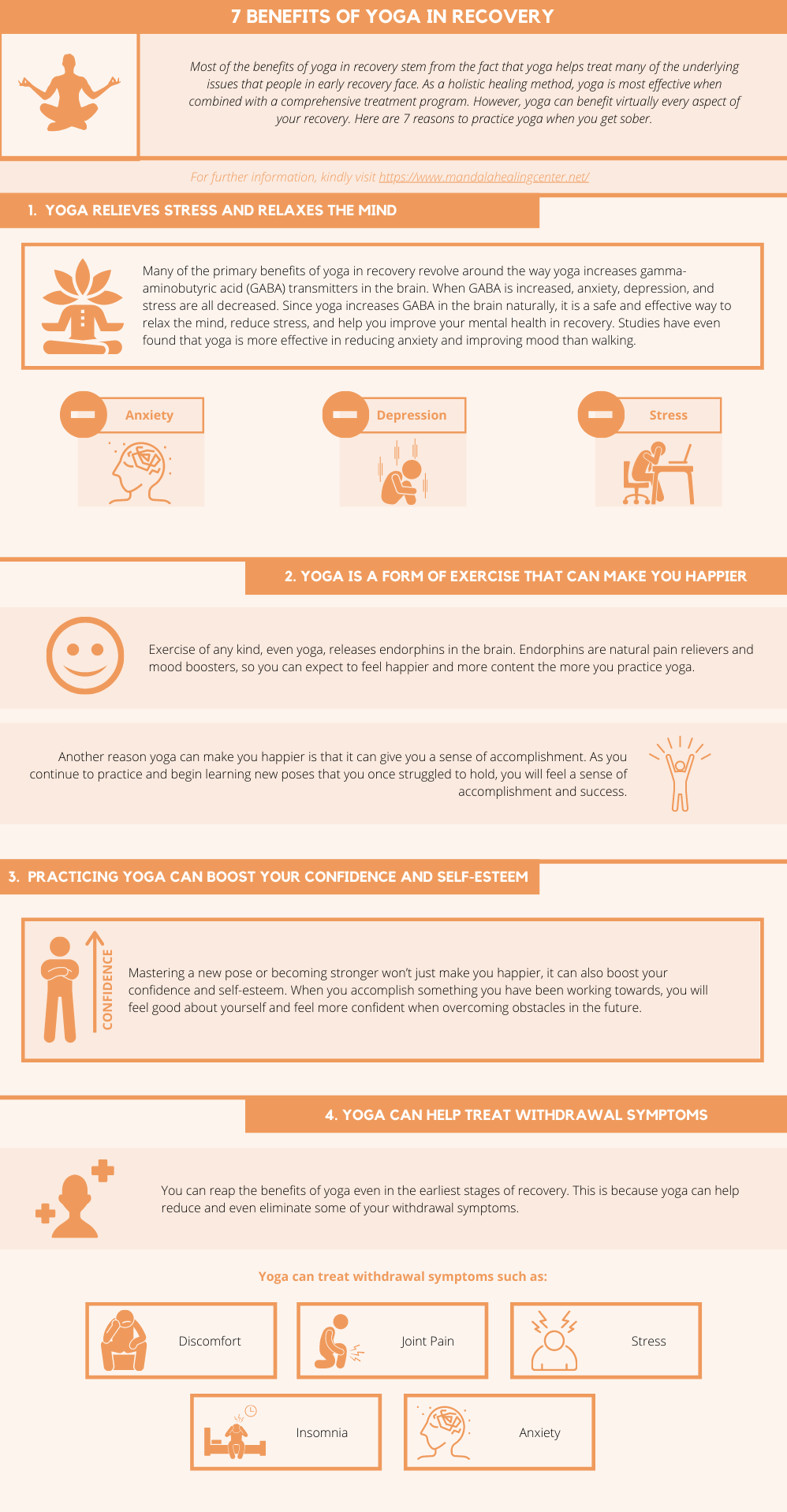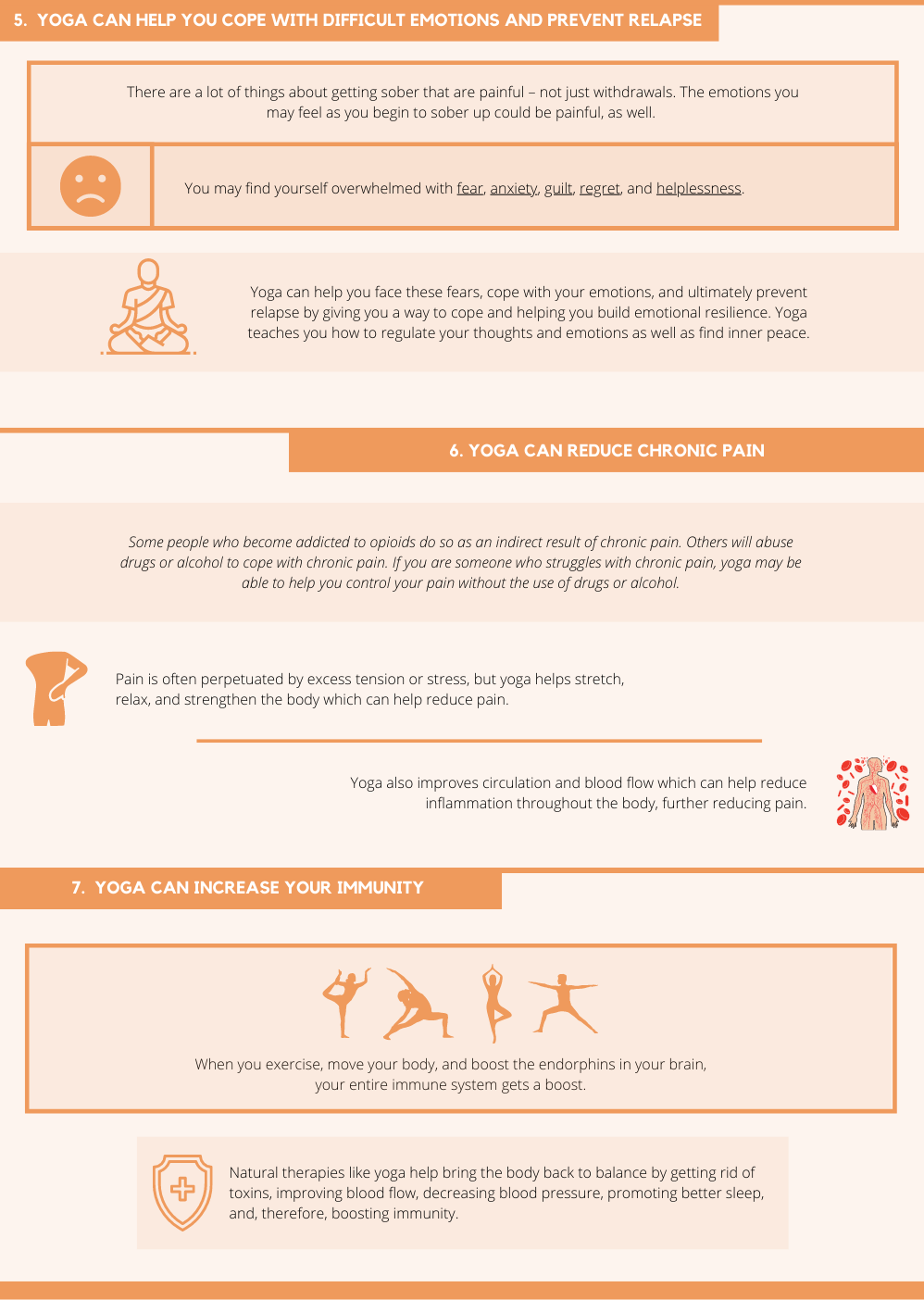Most of the benefits of yoga in recovery stem from the fact that yoga helps treat many of the underlying issues that people in early recovery face. As a holistic healing method, yoga is most effective when combined with a comprehensive treatment program. However, yoga can benefit virtually every aspect of your recovery. Here are 7 reasons to practice yoga when you get sober.

1. Yoga Relieves Stress and Relaxes The Mind
Many of the primary benefits of yoga in recovery revolve around the way yoga increases gamma-aminobutyric acid (GABA) transmitters in the brain. When GABA is increased, anxiety, depression, and stress are all decreased.
When you first get sober, one of the reasons you will feel sick from withdrawal is because your central nervous system is overactive and trying to adjust back to being sober. It is also suffering from a GABA deficiency.
Since yoga increases GABA in the brain naturally, it is a safe and effective way to relax the mind, reduce stress, and help you improve your mental health in recovery. Studies have even found that yoga is more effective in reducing anxiety and improving mood than walking.[1]
2. Yoga is a Form of Exercise That Can Make You Happier
Exercise of any kind, even yoga, releases endorphins in the brain. Endorphins are natural pain relievers and mood boosters, so you can expect to feel happier and more content the more you practice yoga.[1]
Another reason yoga can make you happier is that it can give you a sense of accomplishment. As you continue to practice and begin learning new poses that you once struggled to hold, you will feel a sense of accomplishment and success.
3. Practicing Yoga Can Boost Your Confidence and Self-Esteem
Mastering a new pose or becoming stronger won’t just make you happier, it can also boost your confidence and self-esteem. When you accomplish something you have been working towards, you will feel good about yourself and feel more confident when overcoming obstacles in the future.
4. Yoga Can Help Treat Withdrawal Symptoms
You can reap the benefits of yoga even in the earliest stages of recovery. This is because yoga can help reduce and even eliminate some of your withdrawal symptoms.
When you first get sober, you will have to detox. You may experience discomfort, joint pain, insomnia, stress, and anxiety. The good news is that yoga can help ease many of these symptoms.
Detox usually involves medications and clinical support. However, yoga is a great way to cope with symptoms of withdrawal and distract you while you’re detoxing.[2]
5. Yoga Can Help You Cope With Difficult Emotions and Prevent Relapse
There are a lot of things about getting sober that are painful – not just withdrawals. The emotions you may feel as you begin to sober up could be painful, as well. You may find yourself overwhelmed with fear, anxiety, guilt, regret, and helplessness.
Yoga can help you face these fears, cope with your emotions, and ultimately prevent relapse by giving you a way to cope and helping you build emotional resilience. Yoga teaches you how to regulate your thoughts and emotions as well as find inner peace.
After practicing yoga for some time, you will find that it is an effective coping mechanism against relapse triggers. It will help you create more self-control allowing you to fight back against drug cravings and stay sober.
6. Yoga Can Reduce Chronic Pain
Some people who become addicted to opioids do so as an indirect result of chronic pain. Others will abuse drugs or alcohol to cope with chronic pain. If you are someone who struggles with chronic pain, yoga may be able to help you control your pain without the use of drugs or alcohol.
Pain is often perpetuated by excess tension or stress, but yoga helps stretch, relax, and strengthen the body which can help reduce pain. Yoga also improves circulation and blood flow which can help reduce inflammation throughout the body, further reducing pain.[3]
Another reason why yoga can help treat pain is that it is a natural way to boost endorphins – the body’s built-in pain relievers.
7. Yoga Can Increase Your Immunity
When you exercise, move your body, and boost the endorphins in your brain, your entire immune system gets a boost. Natural therapies like yoga help bring the body back to balance by getting rid of toxins, improving blood flow, decreasing blood pressure, promoting better sleep, and, therefore, boosting immunity.[4]
Long-term substance abuse can make you more susceptible to viruses and illnesses, even those like COVID-19. Fortunately, yoga can be a great way to boost your immune system naturally and protect against sickness in early recovery.
See The Benefits of Yoga in Recovery For Yourself
There are many benefits of incorporating yoga into your recovery. It will make you feel better – both inside and out – help you prevent relapse, and improve your overall well-being.
At Mandala Healing Center, we take a holistic approach to addiction to help heal the mind, body, and spirit. We understand that recovery happens breath-by-breath, which is why healing and practicing yoga is such a natural combination. Patients work through the yoga postures, finding their own way and uncovering recovery challenges and successes as they go.
Give one of our addiction specialists a call now to get your recovery journey started.
References:













